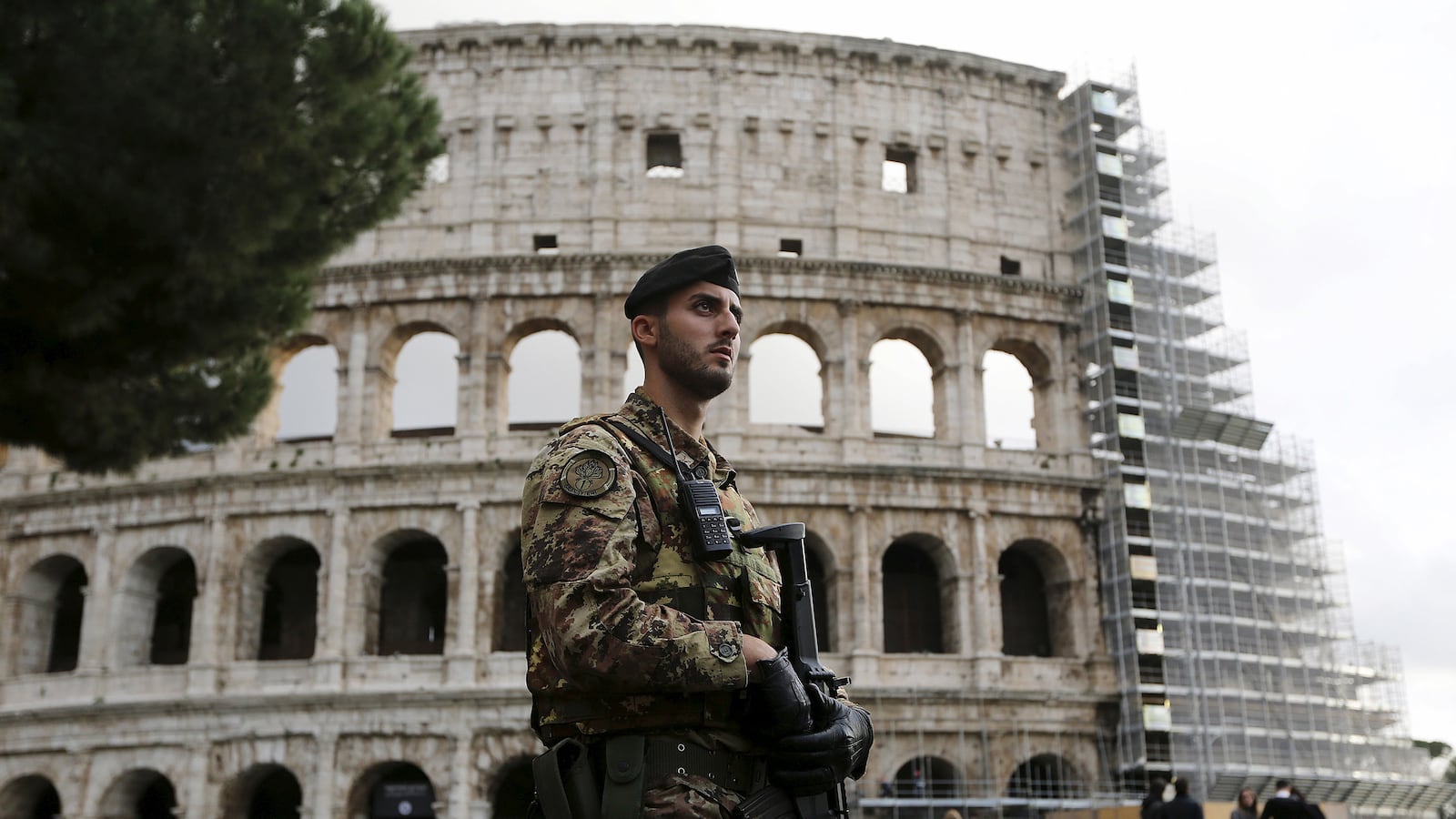ROME — Mohamed Lahlaoui was not supposed to be in Europe when he was arrested in Germany last week on terrorism charges. The 28-year-old Moroccan was deported from the northern Italian city of Brescia back in May 2014 after he violated the conditions of his house arrest, which he was serving for attempted murder, concealing an illegal weapon, and garden-variety drug charges.
But he apparently never left Europe. Or, if he did, it wasn’t much of a getaway, because traces of him in Belgium, France, and Germany date back to the summer he was deported. When Lahlaoui was arrested at a train station in Giessen, Germany, last week, his name wasn’t at the top of any terror watch list, but he was identified as persona non grata in Europe because of his Italian criminal record. Acting out of an abundance of vigilance, German police said they checked his cellphone and found a message from Khalid el-Bakraoui, one of the suicide-bomber brothers who blew himself up along with 20 passengers in a Brussels subway on March 22. The message was sent at 9:08 a.m., just three minutes before the bomb went off. It said, simply, “fin”—French for “the end.”
Now authorities are tying to connect the dots between Lahlaoui and a number of other terror suspects who seem to have an Italian connection. They know that Bakraoui was in Italy last summer after records show he flew to Treviso on a Ryanair flight from Brussels on July 23. The would-be bomber then flew to Athens from Venice a day later, just a week before Salah Abdeslam, the man whose arrest has been tied to the Brussels bombings and the Paris attacks, also traveled through Italy by way of Bari on his way to Greece, before returning to Italy a week later.
Lahlaoui may have also been an acquaintance of Abdeslam. According to German press reports, police in Germany say Lahlaoui was treated in a Belgian emergency room for knife wounds the same day Abdeslam was arrested, and are now trying to piece together whether those wounds were made in the raid that led to Abdeslam’s arrest.
Authorities in Italy are also trying to determine if Lahlaoui was at all involved with Djamal Eddine Ouali, the 40-year-old Algerian picked up in Salerno over the weekend on charges that he supplied false documents to the Bakraoui brothers and others. Ouali was in Italy with his pregnant wife, who has since disappeared, according to local press reports in Salerno. Also gone are the Opel station wagon Ouali drove and an unnamed Moroccan man who neighbors say lived with the couple. Those same neighbors say Ouali was “always on the phone, speaking in French or Arabic.”
The authorities are especially interested in finding out how it came to be that Bakraoui was able to rent an apartment and travel using a false identity tied to Ibrahim Maaroufi, a Belgian-born Moroccan soccer player who was on the roster for Milan Inter from 2006 to 2009. He made headlines in the soccer world when he famously chose to play for Morocco rather than Belgium in the 2007 Olympics. He now plays for F.C. Shaerbeek, based in the same Brussels neighborhood where bomb-making materials were discovered after the March 22 attacks.
Maaroufi, who is not suspected of any crime, says he has never met Ouali or Khalid el-Bakraoui. He told Italy’s SKY News channel that he learned of his stolen identity back in January and reported it to police. “The first time I heard of this was… when I learned that someone had rented an apartment in my name,” he said. “The police told me not to worry and that I would be called as a witness if they needed me. Then a week ago, the police stopped me on the street and told me it would be better if I went in again to clarify the situation. They know I had nothing to do with this, and they told me that it has nothing to do with me, just that my identity was used.”
But perhaps the most important link Italy’s anti-terrorism police are attempting to make is between Lahlaoui and Anas el-Abboubi, who attended the same Islamic culture center and lived just a few miles from Lahlaoui near Brescia. Abboubi’s name features in the veritable who’s who list of 22,000 ISIS militants leaked to the SKY news in early March. Italian authorities say Abboubi, a jihadi rapper featured on an ISIS recruitment video, was radicalized as a youth and founded the Sharia4Italia recruitment website, based on similar sites around Europe.
After giving an interview to MTV about music and Islam, in which he expressed his radical views, anti-terror authorities started trailing him in an operation called Screen Shot and eventually arrested him for planning an attack in Brescia in 2013. Abboubi was released while waiting trial and escaped to Syria, where he changed his name to Anas al-Italy, and continued to post on Sharia4Italia and Facebook until 2015, when his social-networking sites went silent and authorities lost his trail.
If Italy’s counterterrorism police are able to connect the dots between the various names that tie the country to the terrorist attacks in Brussels and Paris, they will be relieved. “It’s far more worrying if these are all separate cells,” Giampiero Massolo, head of coordination for Italy’s secret service, said recently. “If they are all connected, we can work to unravel the thread. If they are separate entities, it’s like searching for a needle in a haystack.”






